Jiayu Zhang
Tri-Select: A Multi-Stage Visual Data Selection Framework for Mobile Visual Crowdsensing
Dec 18, 2025Abstract:Mobile visual crowdsensing enables large-scale, fine-grained environmental monitoring through the collection of images from distributed mobile devices. However, the resulting data is often redundant and heterogeneous due to overlapping acquisition perspectives, varying resolutions, and diverse user behaviors. To address these challenges, this paper proposes Tri-Select, a multi-stage visual data selection framework that efficiently filters redundant and low-quality images. Tri-Select operates in three stages: (1) metadata-based filtering to discard irrelevant samples; (2) spatial similarity-based spectral clustering to organize candidate images; and (3) a visual-feature-guided selection based on maximum independent set search to retain high-quality, representative images. Experiments on real-world and public datasets demonstrate that Tri-Select improves both selection efficiency and dataset quality, making it well-suited for scalable crowdsensing applications.
NL2Repo-Bench: Towards Long-Horizon Repository Generation Evaluation of Coding Agents
Dec 14, 2025Abstract:Recent advances in coding agents suggest rapid progress toward autonomous software development, yet existing benchmarks fail to rigorously evaluate the long-horizon capabilities required to build complete software systems. Most prior evaluations focus on localized code generation, scaffolded completion, or short-term repair tasks, leaving open the question of whether agents can sustain coherent reasoning, planning, and execution over the extended horizons demanded by real-world repository construction. To address this gap, we present NL2Repo Bench, a benchmark explicitly designed to evaluate the long-horizon repository generation ability of coding agents. Given only a single natural-language requirements document and an empty workspace, agents must autonomously design the architecture, manage dependencies, implement multi-module logic, and produce a fully installable Python library. Our experiments across state-of-the-art open- and closed-source models reveal that long-horizon repository generation remains largely unsolved: even the strongest agents achieve below 40% average test pass rates and rarely complete an entire repository correctly. Detailed analysis uncovers fundamental long-horizon failure modes, including premature termination, loss of global coherence, fragile cross-file dependencies, and inadequate planning over hundreds of interaction steps. NL2Repo Bench establishes a rigorous, verifiable testbed for measuring sustained agentic competence and highlights long-horizon reasoning as a central bottleneck for the next generation of autonomous coding agents.
SUGAR: Learning Skeleton Representation with Visual-Motion Knowledge for Action Recognition
Nov 13, 2025Abstract:Large Language Models (LLMs) hold rich implicit knowledge and powerful transferability. In this paper, we explore the combination of LLMs with the human skeleton to perform action classification and description. However, when treating LLM as a recognizer, two questions arise: 1) How can LLMs understand skeleton? 2) How can LLMs distinguish among actions? To address these problems, we introduce a novel paradigm named learning Skeleton representation with visUal-motion knowledGe for Action Recognition (SUGAR). In our pipeline, we first utilize off-the-shelf large-scale video models as a knowledge base to generate visual, motion information related to actions. Then, we propose to supervise skeleton learning through this prior knowledge to yield discrete representations. Finally, we use the LLM with untouched pre-training weights to understand these representations and generate the desired action targets and descriptions. Notably, we present a Temporal Query Projection (TQP) module to continuously model the skeleton signals with long sequences. Experiments on several skeleton-based action classification benchmarks demonstrate the efficacy of our SUGAR. Moreover, experiments on zero-shot scenarios show that SUGAR is more versatile than linear-based methods.
SVC 2025: the First Multimodal Deception Detection Challenge
Aug 06, 2025Abstract:Deception detection is a critical task in real-world applications such as security screening, fraud prevention, and credibility assessment. While deep learning methods have shown promise in surpassing human-level performance, their effectiveness often depends on the availability of high-quality and diverse deception samples. Existing research predominantly focuses on single-domain scenarios, overlooking the significant performance degradation caused by domain shifts. To address this gap, we present the SVC 2025 Multimodal Deception Detection Challenge, a new benchmark designed to evaluate cross-domain generalization in audio-visual deception detection. Participants are required to develop models that not only perform well within individual domains but also generalize across multiple heterogeneous datasets. By leveraging multimodal data, including audio, video, and text, this challenge encourages the design of models capable of capturing subtle and implicit deceptive cues. Through this benchmark, we aim to foster the development of more adaptable, explainable, and practically deployable deception detection systems, advancing the broader field of multimodal learning. By the conclusion of the workshop competition, a total of 21 teams had submitted their final results. https://sites.google.com/view/svc-mm25 for more information.
ASRC-SNN: Adaptive Skip Recurrent Connection Spiking Neural Network
May 16, 2025Abstract:In recent years, Recurrent Spiking Neural Networks (RSNNs) have shown promising potential in long-term temporal modeling. Many studies focus on improving neuron models and also integrate recurrent structures, leveraging their synergistic effects to improve the long-term temporal modeling capabilities of Spiking Neural Networks (SNNs). However, these studies often place an excessive emphasis on the role of neurons, overlooking the importance of analyzing neurons and recurrent structures as an integrated framework. In this work, we consider neurons and recurrent structures as an integrated system and conduct a systematic analysis of gradient propagation along the temporal dimension, revealing a challenging gradient vanishing problem. To address this issue, we propose the Skip Recurrent Connection (SRC) as a replacement for the vanilla recurrent structure, effectively mitigating the gradient vanishing problem and enhancing long-term temporal modeling performance. Additionally, we propose the Adaptive Skip Recurrent Connection (ASRC), a method that can learn the skip span of skip recurrent connection in each layer of the network. Experiments show that replacing the vanilla recurrent structure in RSNN with SRC significantly improves the model's performance on temporal benchmark datasets. Moreover, ASRC-SNN outperforms SRC-SNN in terms of temporal modeling capabilities and robustness.
ABE: A Unified Framework for Robust and Faithful Attribution-Based Explainability
May 03, 2025Abstract:Attribution algorithms are essential for enhancing the interpretability and trustworthiness of deep learning models by identifying key features driving model decisions. Existing frameworks, such as InterpretDL and OmniXAI, integrate multiple attribution methods but suffer from scalability limitations, high coupling, theoretical constraints, and lack of user-friendly implementations, hindering neural network transparency and interoperability. To address these challenges, we propose Attribution-Based Explainability (ABE), a unified framework that formalizes Fundamental Attribution Methods and integrates state-of-the-art attribution algorithms while ensuring compliance with attribution axioms. ABE enables researchers to develop novel attribution techniques and enhances interpretability through four customizable modules: Robustness, Interpretability, Validation, and Data & Model. This framework provides a scalable, extensible foundation for advancing attribution-based explainability and fostering transparent AI systems. Our code is available at: https://github.com/LMBTough/ABE-XAI.
Learning to Be A Doctor: Searching for Effective Medical Agent Architectures
Apr 15, 2025Abstract:Large Language Model (LLM)-based agents have demonstrated strong capabilities across a wide range of tasks, and their application in the medical domain holds particular promise due to the demand for high generalizability and reliance on interdisciplinary knowledge. However, existing medical agent systems often rely on static, manually crafted workflows that lack the flexibility to accommodate diverse diagnostic requirements and adapt to emerging clinical scenarios. Motivated by the success of automated machine learning (AutoML), this paper introduces a novel framework for the automated design of medical agent architectures. Specifically, we define a hierarchical and expressive agent search space that enables dynamic workflow adaptation through structured modifications at the node, structural, and framework levels. Our framework conceptualizes medical agents as graph-based architectures composed of diverse, functional node types and supports iterative self-improvement guided by diagnostic feedback. Experimental results on skin disease diagnosis tasks demonstrate that the proposed method effectively evolves workflow structures and significantly enhances diagnostic accuracy over time. This work represents the first fully automated framework for medical agent architecture design and offers a scalable, adaptable foundation for deploying intelligent agents in real-world clinical environments.
LAG: LLM agents for Leaderboard Auto Generation on Demanding
Feb 25, 2025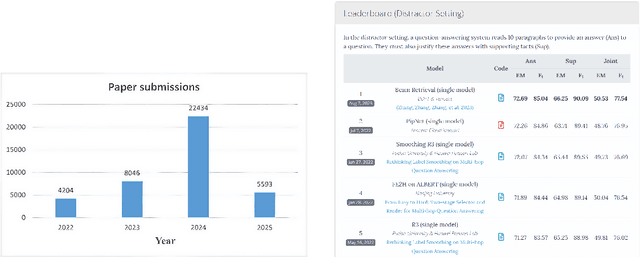

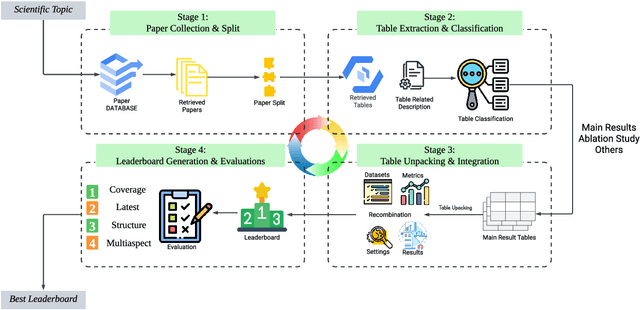

Abstract:This paper introduces Leaderboard Auto Generation (LAG), a novel and well-organized framework for automatic generation of leaderboards on a given research topic in rapidly evolving fields like Artificial Intelligence (AI). Faced with a large number of AI papers updated daily, it becomes difficult for researchers to track every paper's proposed methods, experimental results, and settings, prompting the need for efficient automatic leaderboard construction. While large language models (LLMs) offer promise in automating this process, challenges such as multi-document summarization, leaderboard generation, and experiment fair comparison still remain under exploration. LAG solves these challenges through a systematic approach that involves the paper collection, experiment results extraction and integration, leaderboard generation, and quality evaluation. Our contributions include a comprehensive solution to the leaderboard construction problem, a reliable evaluation method, and experimental results showing the high quality of leaderboards.
A3: Android Agent Arena for Mobile GUI Agents
Jan 02, 2025



Abstract:AI agents have become increasingly prevalent in recent years, driven by significant advancements in the field of large language models (LLMs). Mobile GUI agents, a subset of AI agents, are designed to autonomously perform tasks on mobile devices. While numerous studies have introduced agents, datasets, and benchmarks to advance mobile GUI agent research, many existing datasets focus on static frame evaluations and fail to provide a comprehensive platform for assessing performance on real-world, in-the-wild tasks. To address this gap, we present Android Agent Arena (A3), a novel evaluation platform. Unlike existing in-the-wild systems, A3 offers: (1) meaningful and practical tasks, such as real-time online information retrieval and operational instructions; (2) a larger, more flexible action space, enabling compatibility with agents trained on any dataset; and (3) automated business-level LLM-based evaluation process. A3 includes 21 widely used general third-party apps and 201 tasks representative of common user scenarios, providing a robust foundation for evaluating mobile GUI agents in real-world situations and a new autonomous evaluation process for less human labor and coding expertise. The project is available at \url{https://yuxiangchai.github.io/Android-Agent-Arena/}.
Attribution for Enhanced Explanation with Transferable Adversarial eXploration
Dec 27, 2024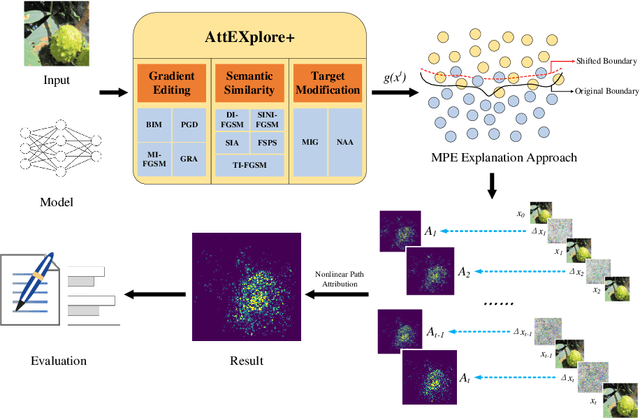

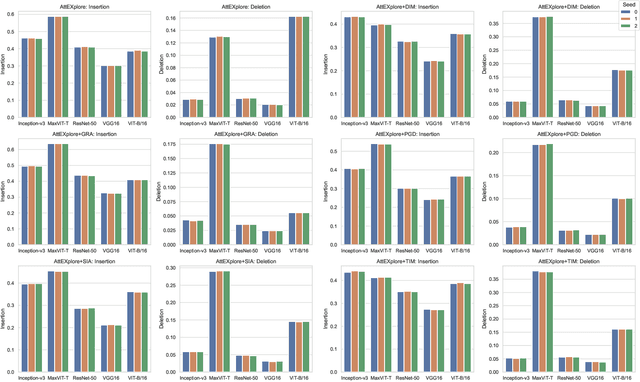
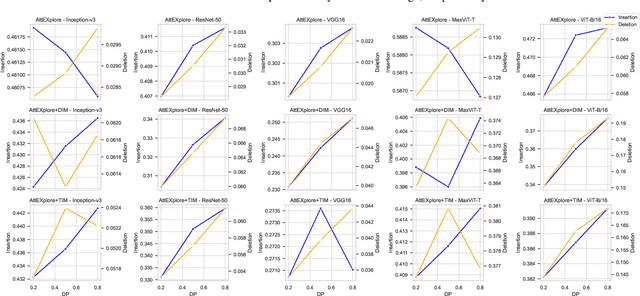
Abstract:The interpretability of deep neural networks is crucial for understanding model decisions in various applications, including computer vision. AttEXplore++, an advanced framework built upon AttEXplore, enhances attribution by incorporating transferable adversarial attack methods such as MIG and GRA, significantly improving the accuracy and robustness of model explanations. We conduct extensive experiments on five models, including CNNs (Inception-v3, ResNet-50, VGG16) and vision transformers (MaxViT-T, ViT-B/16), using the ImageNet dataset. Our method achieves an average performance improvement of 7.57\% over AttEXplore and 32.62\% compared to other state-of-the-art interpretability algorithms. Using insertion and deletion scores as evaluation metrics, we show that adversarial transferability plays a vital role in enhancing attribution results. Furthermore, we explore the impact of randomness, perturbation rate, noise amplitude, and diversity probability on attribution performance, demonstrating that AttEXplore++ provides more stable and reliable explanations across various models. We release our code at: https://anonymous.4open.science/r/ATTEXPLOREP-8435/
 Add to Chrome
Add to Chrome Add to Firefox
Add to Firefox Add to Edge
Add to Edge